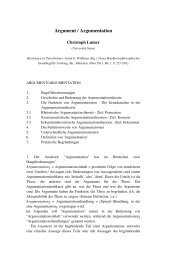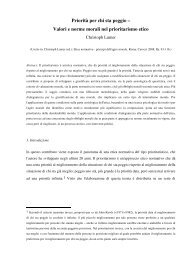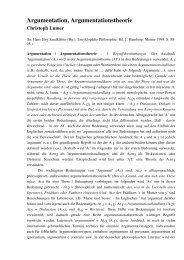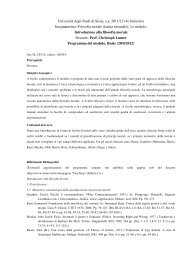What is Practical Knowledge? - Prof. Dr. Christoph Lumer
What is Practical Knowledge? - Prof. Dr. Christoph Lumer
What is Practical Knowledge? - Prof. Dr. Christoph Lumer
You also want an ePaper? Increase the reach of your titles
YUMPU automatically turns print PDFs into web optimized ePapers that Google loves.
<strong>Lumer</strong>: <strong>What</strong> Is <strong>Practical</strong> <strong>Knowledge</strong>? 19of a certain assessment criterion. Such a room for influencing the way to decide <strong>is</strong> not included inHume's theory of action (cf. Hume 1739/1740, II,3,3). As a consequence, knowledge can play a byfar more important role in dec<strong>is</strong>ions than Hume's theory allows.On the bas<strong>is</strong> of what has been set out so far, with the help of an example we can nowexplain how the above introduced stability criterion (for choosing among the various ep<strong>is</strong>temicallyaccessible and motivationally effective ways of deciding and thus for defining the 'good') works,i.e. the criterion for using those ways of deciding that are stable with respect to new knowledge.The example I want to use <strong>is</strong> the criterion for intrinsic valuation, or more prec<strong>is</strong>ely the criteria fororiginally intrinsic valuation, i.e. an intrinsic valuation that does not result from confusion betweenintrinsic and prospect valuation. There are three criteria of originally intrinsic valuation: 1. simplehedonic, 2. corrected hedonic and 3. feeling-induced valuation. That a person applies such acriterion does not imply that she can formulate it; "applying a criterion" here shall only mean thatthe person values as if she were consciously applying the respective criterion. There are no further,justificatory cognitive considerations behind these criteria -- otherw<strong>is</strong>e they would not be criteriafor intrinsic valuation. The uniformity of these criteria among humans has led to the above claimthat these criteria are inborn (in a certain sense).According to simple psychological hedon<strong>is</strong>m, 15 the personal intrinsic value of feelings -- corporalfeelings, emotions and moods -- corresponds to the product of their (positively or negatively)sensed intensity and their duration, or more prec<strong>is</strong>ely: to the integral of their sensed intensity overtime. Th<strong>is</strong> hedonic criterion corresponds to Bentham's quantitative hedon<strong>is</strong>m (Bentham 1780/1789,sects. I,1; III,1; IV,2-5).Corrected hedon<strong>is</strong>m <strong>is</strong> a more elaborate form of hedon<strong>is</strong>m, which takes the possibility ofmanipulation into account: Feelings that are not manipulated are valued as in simple hedon<strong>is</strong>m, andso are manipulated negative feelings. Manipulated positive feelings, however, e.g. positive feelingsevoked by drug use or by Nozick's experience machine (Nozick 1989, ch. X), are d<strong>is</strong>countedaccording to the degree of manipulation they are based on (<strong>Lumer</strong> 2000, pp. 493-521). Correctedhedon<strong>is</strong>m <strong>is</strong> not a beginner's criterion for intrinsic valuation. Rather, people who first are simplehedon<strong>is</strong>ts usually switch to corrected hedon<strong>is</strong>m after having intensively considered the possibilityof manipulating feelings. Knowing about th<strong>is</strong> possibility induces them to accept and use the newcriterion. However, th<strong>is</strong> knowledge <strong>is</strong> not a prem<strong>is</strong>e from which together with the original simplehedon<strong>is</strong>m the new criterion of corrected hedon<strong>is</strong>m <strong>is</strong> inferred. Acquiring th<strong>is</strong> knowledge onlytriggers the conception and use of th<strong>is</strong> new criterion.15 In addition to the d<strong>is</strong>tinction between psychological (i.e. empirical) and rational hedon<strong>is</strong>m one may d<strong>is</strong>tingu<strong>is</strong>hbetween weak and strong psychological hedon<strong>is</strong>m. Strong psychological hedon<strong>is</strong>m claims that our (originally)intrinsic valuations are always hedon<strong>is</strong>tic; weak psychological hedon<strong>is</strong>m, by contrast, claims that our(originally) intrinsic valuations of our own feelings are always hedon<strong>is</strong>tic but that there may be objects otherthan our own feelings to which we (originally) attribute intrinsic desirabilities. Because, in the following,feeling-induced intrinsic valuations are assumed to be another form of empirically ex<strong>is</strong>ting intrinsicvaluations, here, of course, always weak hedon<strong>is</strong>m <strong>is</strong> meant.





![Vorwort [Biographie und Laudatio Wolfgang Lenzen]](https://img.yumpu.com/40262871/1/184x260/vorwort-biographie-und-laudatio-wolfgang-lenzen.jpg?quality=85)

